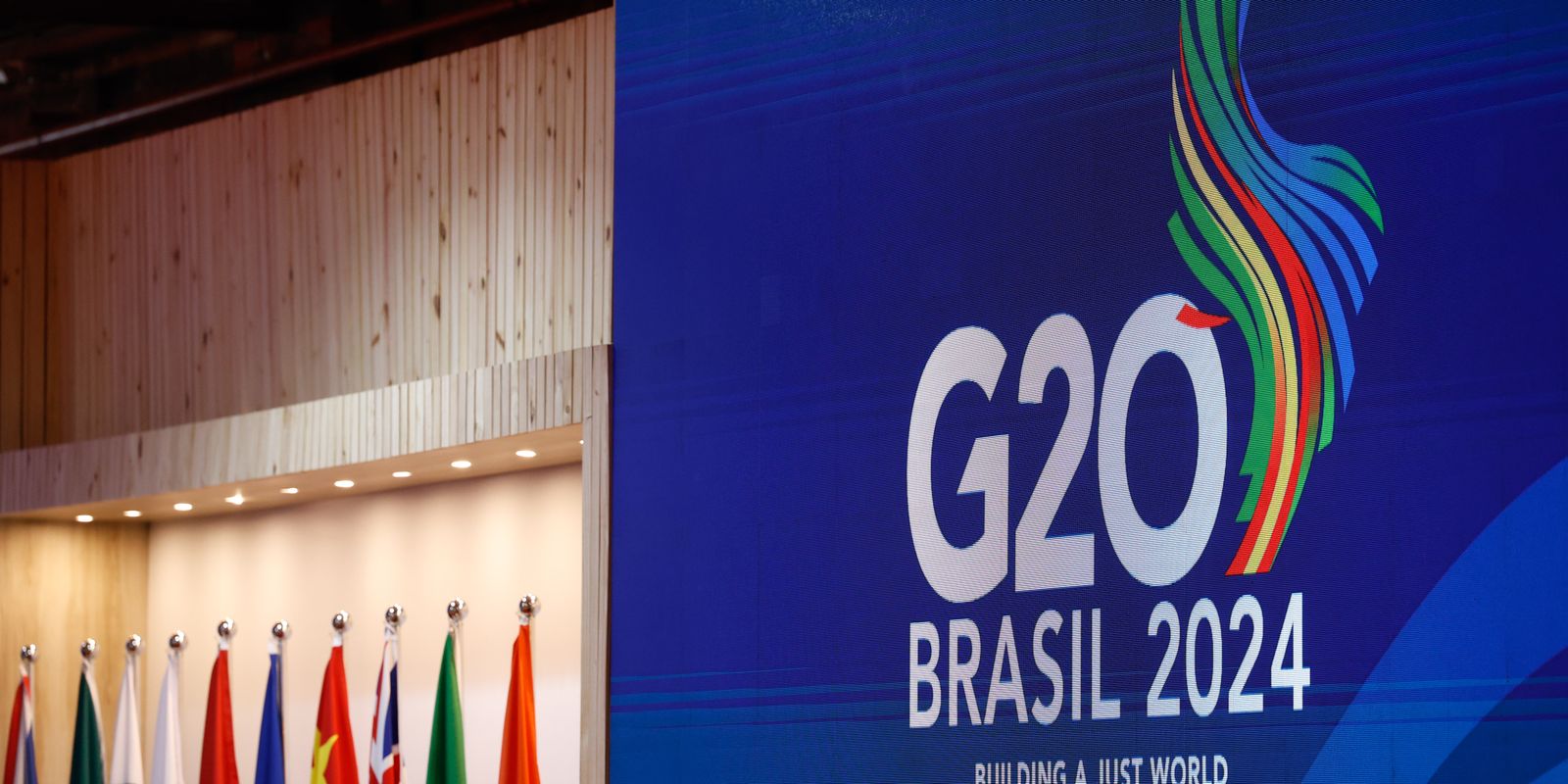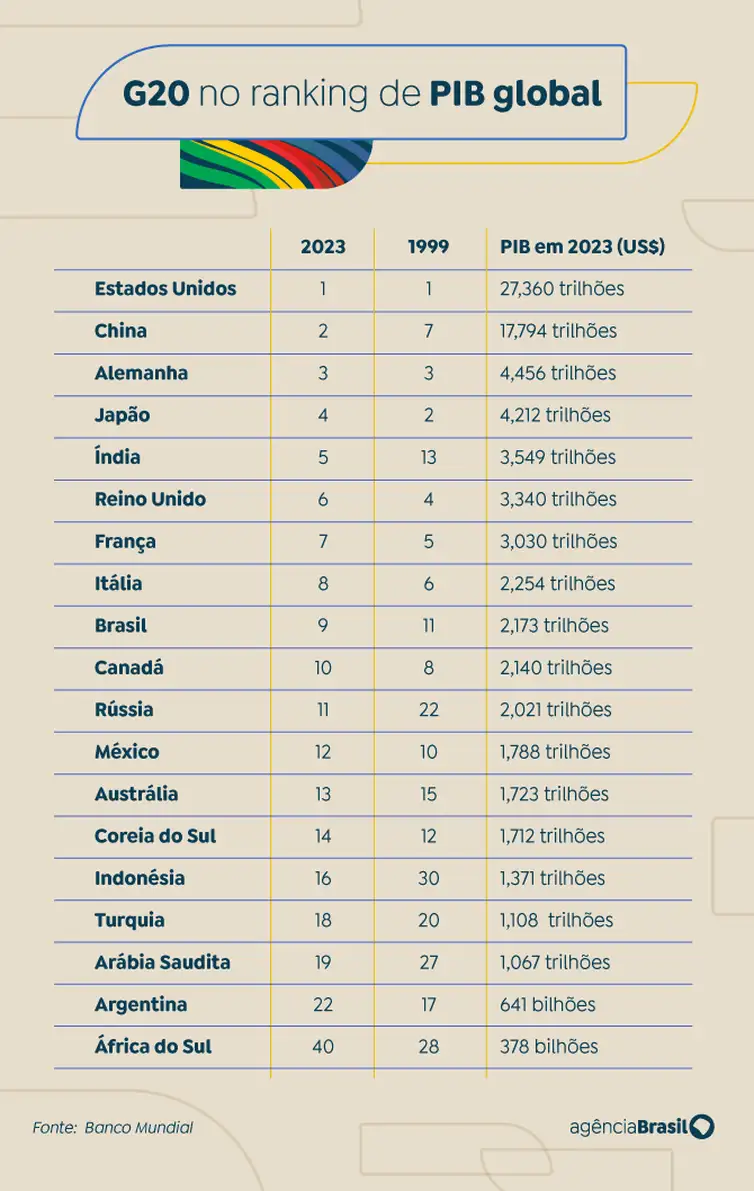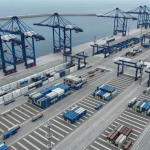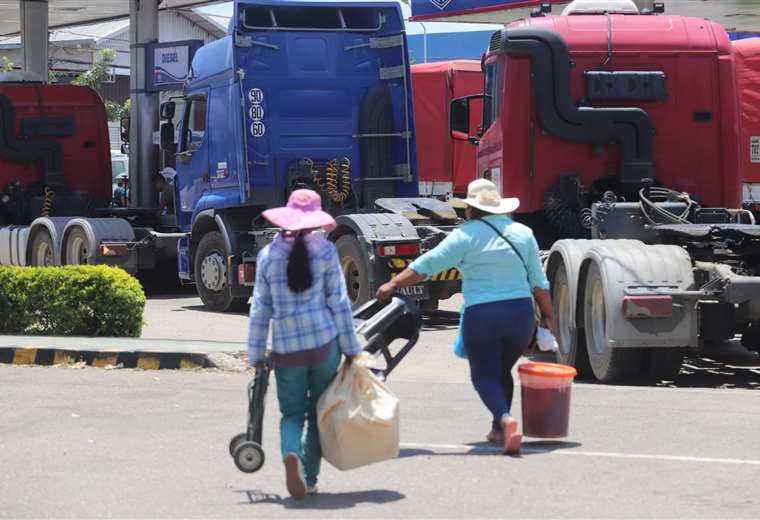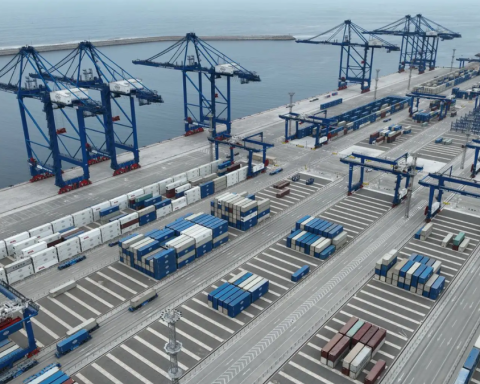In the 25 years of existence of the G20, a forum that brings together the world’s main economies, the group’s members have seen great leaps by emerging nations in the world ranking of Gross Domestic Product (GDP), a metric that corresponds to the set of goods and services produced in a country and points out the size of an economy.
The two most populous countries on the planet, China and India, have stood out in this scenario in the last quarter of a century and appear in the select group of the five largest economies in the world.
On the eve of the G20 summit meeting, which takes place this Monday (18) and Tuesday (19), in Rio de Janeiro, the Brazil Agency carried out a survey of how the economies of these countries have behaved in the world rankings since the creation of the bloc. The comparison was made based on 2023 data gathered by the World Bank.
The G20 was born in 1999, proposing to be a forum for discussions on scenarios, dynamics and challenges of the international economy, notably after a series of economic crises that spread across the world with global repercussions.
“The 1990s were marked by a series of serious economic crises, the first time that any of them began in Asia. They began in 1992, with the crisis of the European monetary system, soon followed by currency crises in Mexico, in 1994, in Southeast Asia, in 1997, in Russia, in 1998, and in Brazil, in 1999”, lists the coordinator graduate in International Relations from the Institute of Strategic Studies at the Fluminense Federal University (UFF), Fernando Roberto de Freitas Almeida.
Although it was created in 1999, he recalls that at the beginning of the 21st century there was a crisis that began in Argentina, “so serious that the country’s bankruptcy in 2001 was seen by several analysts as a kind of first ‘war’. ‘ of the international financial system against a national State”.
Unlike today when heads of State and Government participate in summit meetings, in the first years of the G20, the leading role fell to Finance ministers and central bank presidents.
G7+ emerging
The choice of G20 members is not a mere selection based on the size of each nation’s GDP, that is, it does not exactly cover the 20 richest countries in the world. The forum is an extension of the G7, a group that brought together countries considered the most industrialized in the world, and a group of 12 emerging economies.
The G7 is made up of the United States, Japan, Germany, the United Kingdom, France, Italy and Canada. Despite being left out, China was, in 1999, the seventh largest economy, surpassing Canada, but is not part of the G7.
The 12 emerging countries that joined the G7 to form the G20 are South Africa, Saudi Arabia, Argentina, Australia, Brazil, China, South Korea, India, Indonesia, Mexico, Russia and Turkey. The 20th member was the European Union. More recently, the African Union was accepted as the 21st representative.
According to data from 1999, four G20 countries were outside the ranking of the 20 largest global economies. Russia was 22nd; Saudi Arabia, 27th; South Africa, 28th and Indonesia, 30th.
On the other hand, Spain, the Netherlands, Switzerland, Sweden and Belgium were among the top 20 economies, but were not included in the G20.
“The idea was to give more voice to emerging countries”, says Fernando Almeida.
New ranking
In 25 years, the global economic scenario has changed. Among the most notable changes are the leaps made by population giants China and India. Currently with 1.411 billion inhabitants, China moved from seventh to second place. With a GDP of US$17.79 trillion, it is second only to the United States, which has a GDP of US$27.36 trillion.
“No country can rival Chinese pre-eminence, after its inclusion in the World Trade Organization (WTO) in 2001. The country, due to purchasing power parity, is already the largest economy in the world”, contextualizes professor Fernando Almeida, using the metric that takes into account the purchasing power of the population.
In the opposite direction, Japan went from the second largest economy to the fourth.
India, which in 2023 overtook China as the most populous country in the world, went from 13th to the fifth largest global GDP. With 1.429 billion inhabitants, it has an economy worth US$3.55 trillion. In 1999, it was 13th. In 2023, India held the presidency of the G20.
“Despite the advances, India is the country in the group with the largest number of citizens living below the poverty line”, says Almeida, from UFF.
Another emerging market that boosted its position in the global GDP ranking is Russia, which rose 11 positions, from 22nd to 11th.
In the direct comparison between 1999 and 2023, Brazil rose two positions, from ninth to 11th. Within this period, Brazil has already ranked as the seventh economy, as well as leaving the list of the 10 largest.
The fourth most populous country in the world, Indonesia, home to 277 million people, was another population giant to climb the list of largest economies. In 25 years, it jumped from 30th to 16th position.
Another emerging market that stood out is Saudi Arabia. The third largest oil producer in the world went from 27th to 19th largest GDP.
Although South Korea fell from 12th to 14th place, Fernando Almeida highlights that the Asian country made economic advances, becoming “the only underdeveloped country that became developed in the 21st century”.
South Africa, the 28th largest GDP in 1999, is currently only the 40th largest. Unlike 25 years ago, it is no longer the largest African economy, a position that fell to Egypt in 2023.
“South Africa went through economic difficulties, lost expression and, during the Indian presidency of the G20, in 2023, the Indian government, realizing the vulnerability of most countries on the African continent, proposed – and was accepted – the inclusion of the Union Africana as a permanent member of the G20”, explains Fernando Almeida.
THE Argentina and Mexico – which alongside Brazil form the trio of Latin Americans in the G20 – fell in the global ranking. Argentina went from 17th to 22nd economy. Mexico moved from 10th to 12th place.
Growth
Professor at the Institute of Economics at the State University of Campinas (Unicamp) Bruno De Conti explains that, in the economic scenario, the world is in a complicated period.
“There are few countries that have grown today. In fact, since the pandemic, countries have not yet recovered as expected”, he assesses.
“The only countries that seem to be growing more or less are the Asian ones. China comes first, but even so, to a lesser extent than in other times”, he adds.
Fernando Almeida, from UFF, highlights Argentina as one of the countries with a loss of pre-eminence. “Surrounded by successive crises”.
De Conti points out that Russia is one of the nations that arrives at the leaders’ meeting in a more complicated political situation, due to the context of war with Ukraine. “The country currently experiencing the most difficulty in this geopolitical scenario.”
The Unicamp professor recalls that Russian President Vladimir Putin himself will not come to Rio de Janeiro, to avoid an arrest order issued by the International Criminal Court (ICC), motivated by accusations of war crimes in Ukraine.
In relation to the United States, the largest global economy, the transfer of power from the current president, Joe Biden, to the elected official, Donald Trump brings uncertainty to the G20 on compliance with the decisions that will be agreed upon, according to experts.
De Conti considers that Brazil, by occupying the presidency of the G20, reaches the meeting of pre-eminent nations, managing to put into practice some of its ideas, especially the Global Alliance Against Hunger.
In 2025, South Africa will chair the international forum. “There is a lot of expectation about South Africa continuing some things that were started by Brazil or even India, a sequence of countries from the Global South”, says De Conti, referring to a group of developing countries.
Summit meeting
Since the end of last year, Brazil has held the temporary presidency of the G20, for a period of one year. Throughout 2024, numerous preparatory meetings were held, in areas such as economy, environment, energy, health, agriculture and international relations. The highlight is the summit meeting, this Monday and Tuesday, with heads of State and Government, in Rio de Janeiro.
The group’s members represent around 85% of the world economy, more than 75% of global trade and around two-thirds of the planet’s population.
